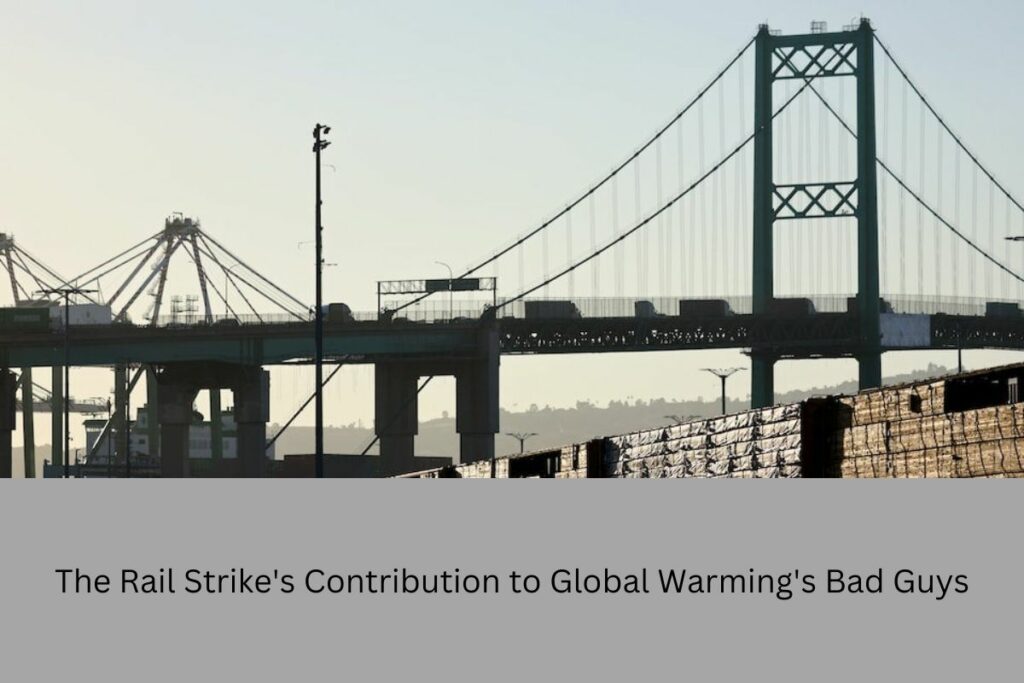The Rail Strike’s Climate Villians. The planet and the workers have similar foes. Naturally, the fossil fuel business wants to prevent this strike. Under a bridge, loaded freight cars are parked. On November 22, lumber-filled freight rail wagons are parked on tracks at the Port of Los Angeles.
A tentative deal that would not give them paid sick leave, a key issue in the contract battle with their employers, was rejected last week by members of four unions that collectively make up 55% of the U.S. freight rail labor force.
On December 9, the four unions are expected to go on strike. In solidarity, eight additional train unions who opposed the accord have promised not to cross a picket line, allowing up to 115,000 workers to join the potential strike.
In order to prevent a strike, Biden urged Congress to step in and require workers to accept the contract on Monday. He warned that a strike might “devastate our economy” and result in up to 765,000 people losing their jobs in a matter of two weeks.
You May Be Interested In:
- After Being Re-elected, What Will Newsom Do?
- Mastriano, a Trump Supporter, Has Conceded the Governorship of Pennsylvania
In an official White House statement, Biden stated that communities “may lose access to chemicals critical to assure safe drinking water” if he did not call for this drastic intervention. “Countries’ farms and ranches might not be able to feed their livestock.” Biden’s position was supported by outgoing House Speaker Nancy Pelosi, who also intends to put the issue to a vote on Wednesday.
Top Democrats, though, are siding with some of the nation’s biggest polluters while opposing rail workers. The American Petroleum Institute, a trade organization for American drillers, and the American Chemistry Council, whose members include ExxonMobil, Chevron, and Total, were two of the 400 organizations that urged Congress to put an end to the strike.
Freight rail is used by petrochemical and refinery facilities to transfer by-products from their production processes, including those that cannot be transported through pipelines. A different interpretation of this situation is that some of the wealthiest people in the country—for example, multibillionaire Warren Buffet, who owns BNSF Railway—are threatening to bring the country to a halt to prevent about 125,000 people from going to the doctor or staying home if they get the flu.
The White House has claimed that unions are risking financial ruin by refusing to accept the deal that it helped negotiate. Pelosi unveiled a plan for two distinct pieces of legislation early on Wednesday in response to worries from some Democrats about siding with rail owners to end the strike: one to prevent the walkout and the other to grant employees seven days of sick leave.
Class, I rail carriers (those with revenue of more than $250 million) have started to operate on razor-thin margins during the last several years, increasing efficiency to give as much profits as possible to shareholders who have consistently voted down resolutions connected to climate change.
That entails limiting a lot of the benefits that permit workers to lead somewhat regular lives, such as taking time off on weekends and when they are ill. According to Jeff Schuhrke’s article for In These Times, major freight train companies have laid off over a third of their personnel as a result of their efficiency drive during the past six years.
While stockholders and CEOs relished the benefits, remaining employees were left to pick up the slack: In 2021, BNSF recorded record profits, while CSX and Union Pacific also made more money than in previous years.
It’s important to keep in mind that the rail barons are also climate-nefarious individuals. The country’s four main freight railroads—BNSF Railway, Norfolk Southern, Union Pacific, and CSX—spent decades and tens of millions of dollars financing climate denial, according to research by researchers and students at Brown University’s Climate and Development Lab.
For every three tonnes of freight transported by rail in America, coal accounted for one-third of the money made by the largest class of railways in 2018. In his article on the Brown team’s investigation into funding for climate denial by the rail industry, Robinson Meyer of The Atlantic highlighted that in the same year, freight rail enabled a staggering 16.5 percent of all U.S. carbon pollution.
All of them were a part of America’s Power, a pro-coal organization that has opposed climate action and was formerly known as the American Coalition for Clean Coal Electricity. According to a recent CSX report, the business “maintained membership in America’s Power through 2021,” at which point it reduced its donation to the organization from $200,000 to $150,000.
Because it felt that America’s Power’s climate goals were “not aligned” with its own climate commitments, CSX decided not to renew its membership for 2022. Although America’s Power no longer maintains a list of its member companies on its website, a page from earlier this year that showed the group’s corporate members did not feature any freight train companies.
By the end of 2020, all four of the major freight rail operators were members, with BNSF Railway and Union Pacific leaving before 2021, then Norfolk Southern and CSX. Union Pacific donated $150,000 to America’s Power between 2017 and 2020.
The owner of BNSF, Buffet, has increased his stake in fossil fuels. In April, his company Berkshire Hathaway surpassed Occidental Petroleum as the largest stakeholder and rose to the position of fourth-largest equity shareholder in Chevron. The Climate Action 100+ organization, which is made up of significant investors, listed Berkshire Hathaway and Saudi Aramco as two of the worst-performing firms on climate change earlier this year.

